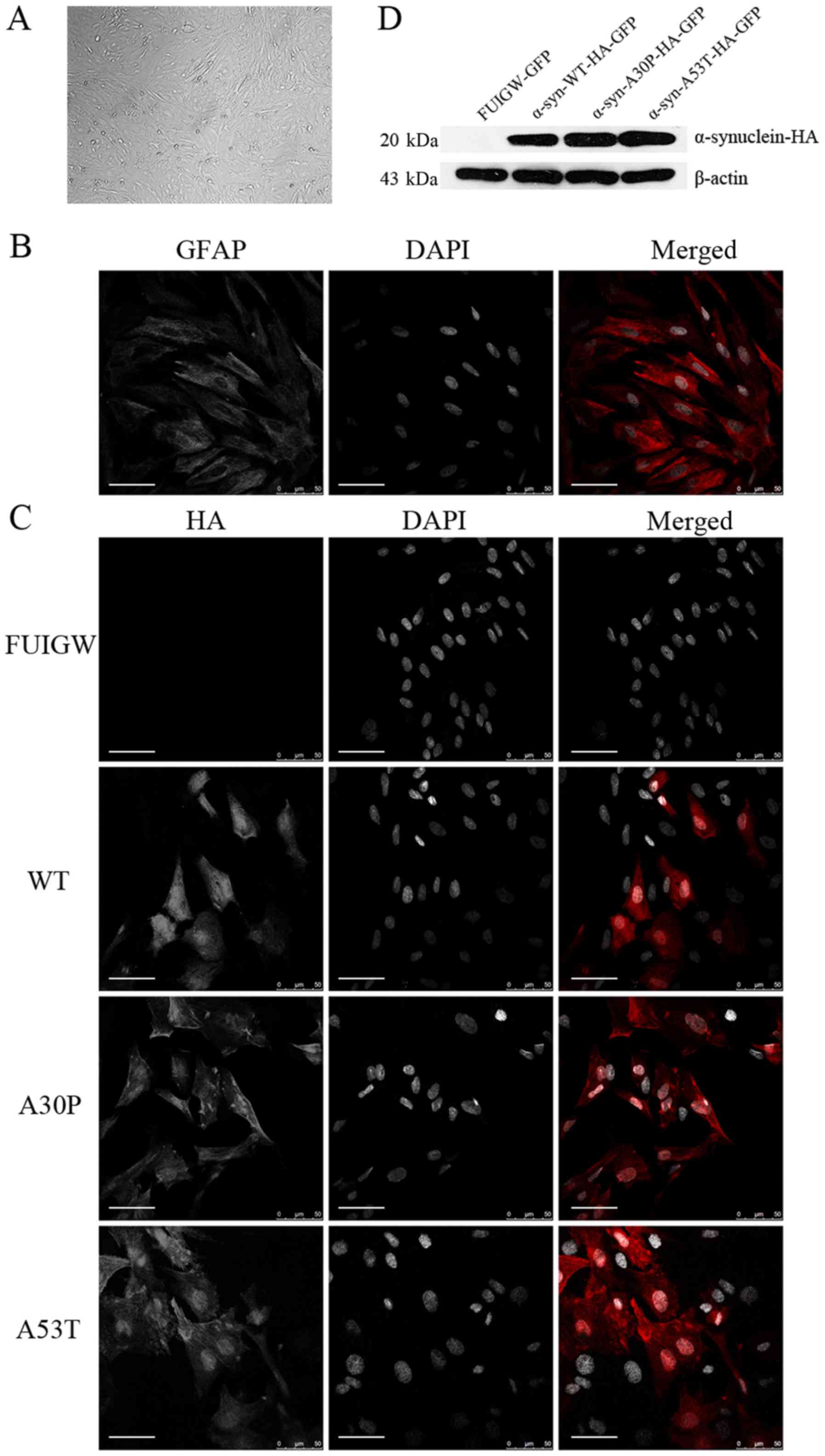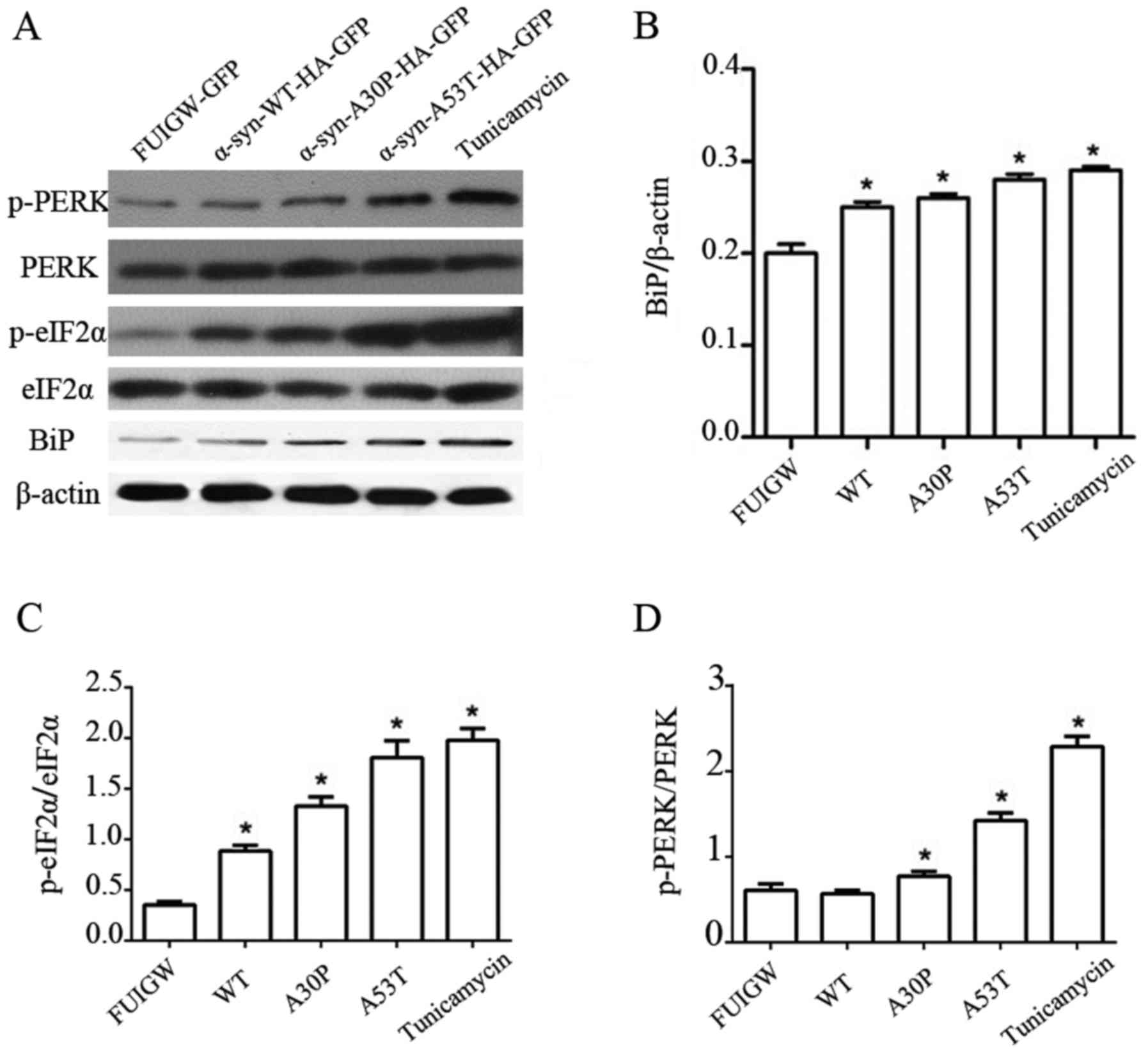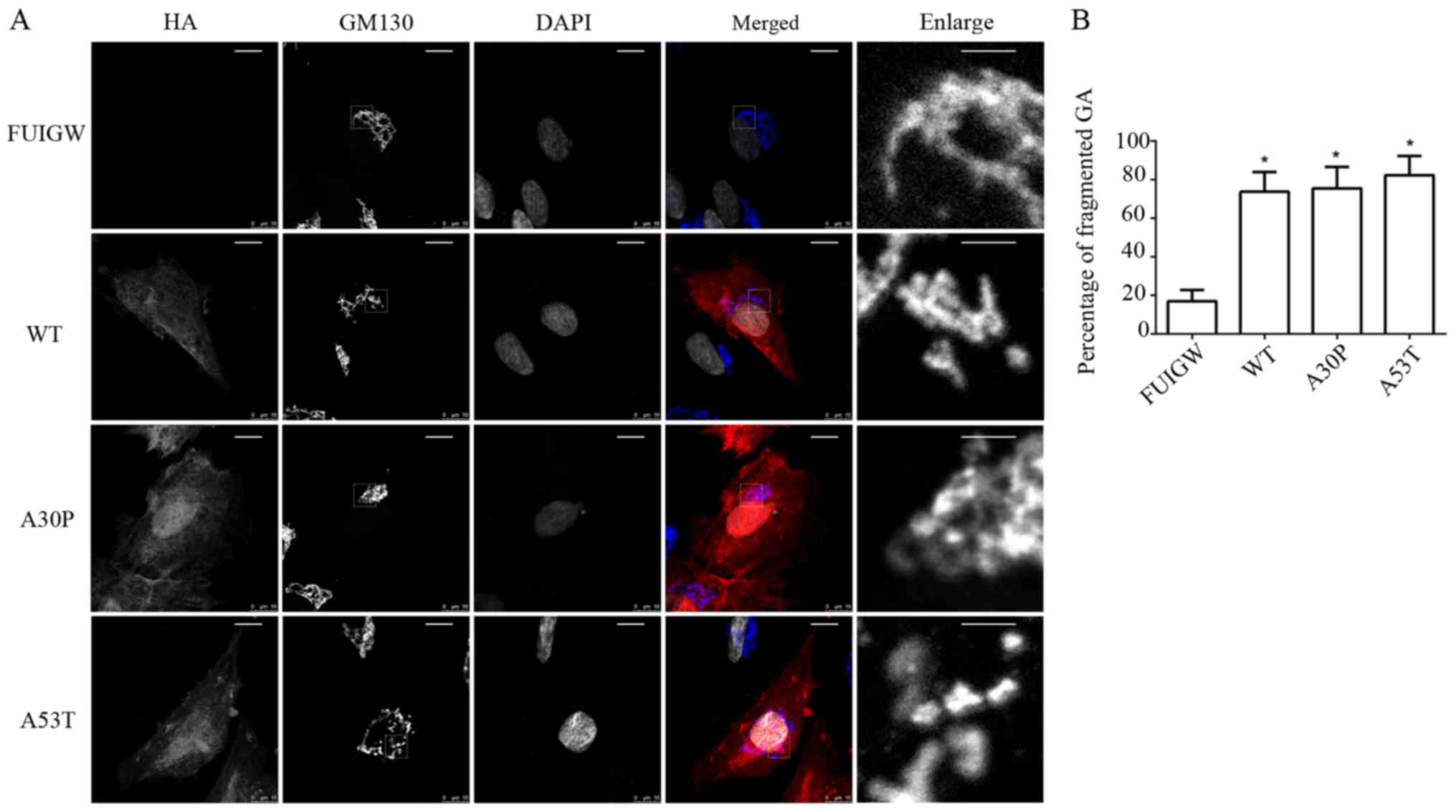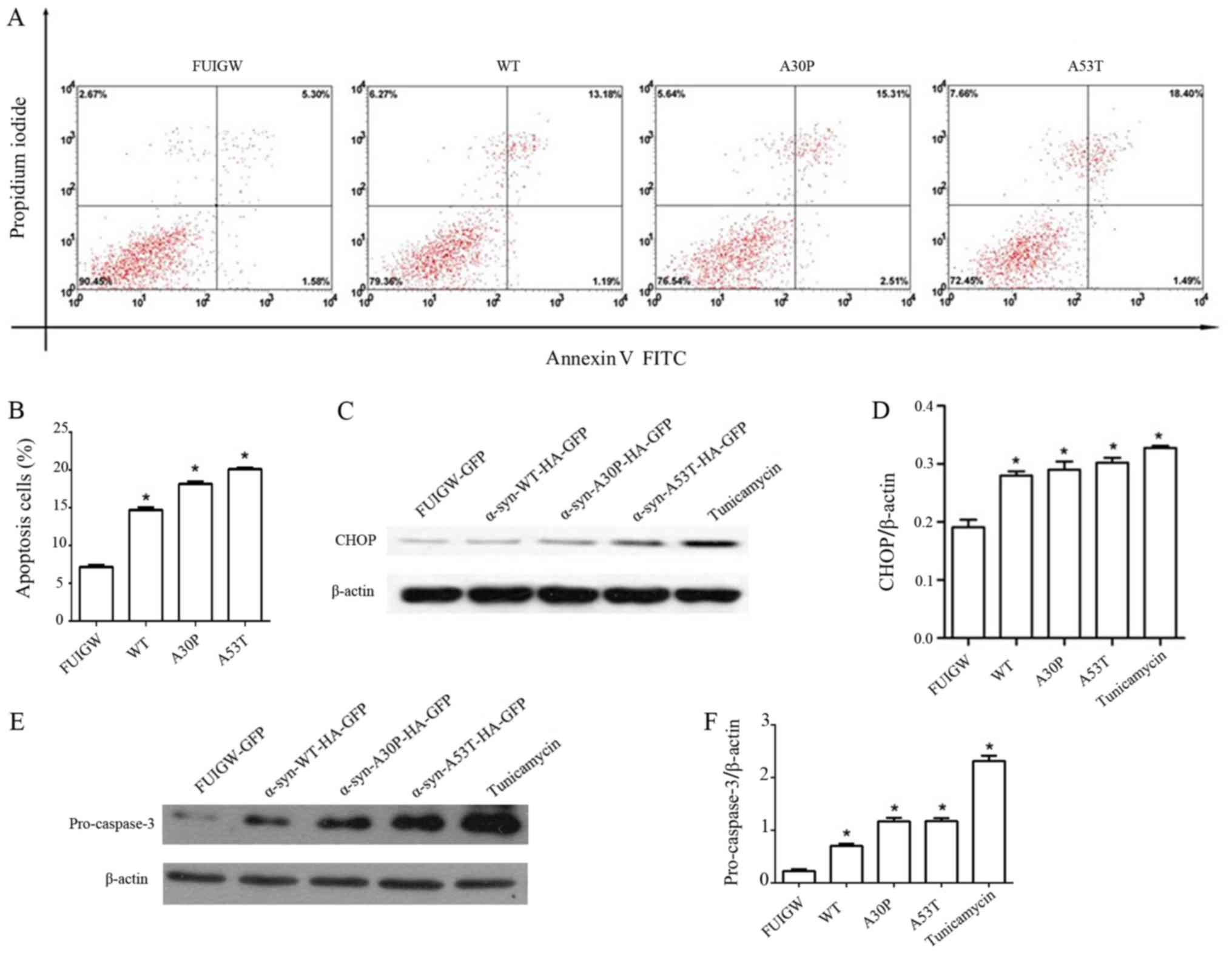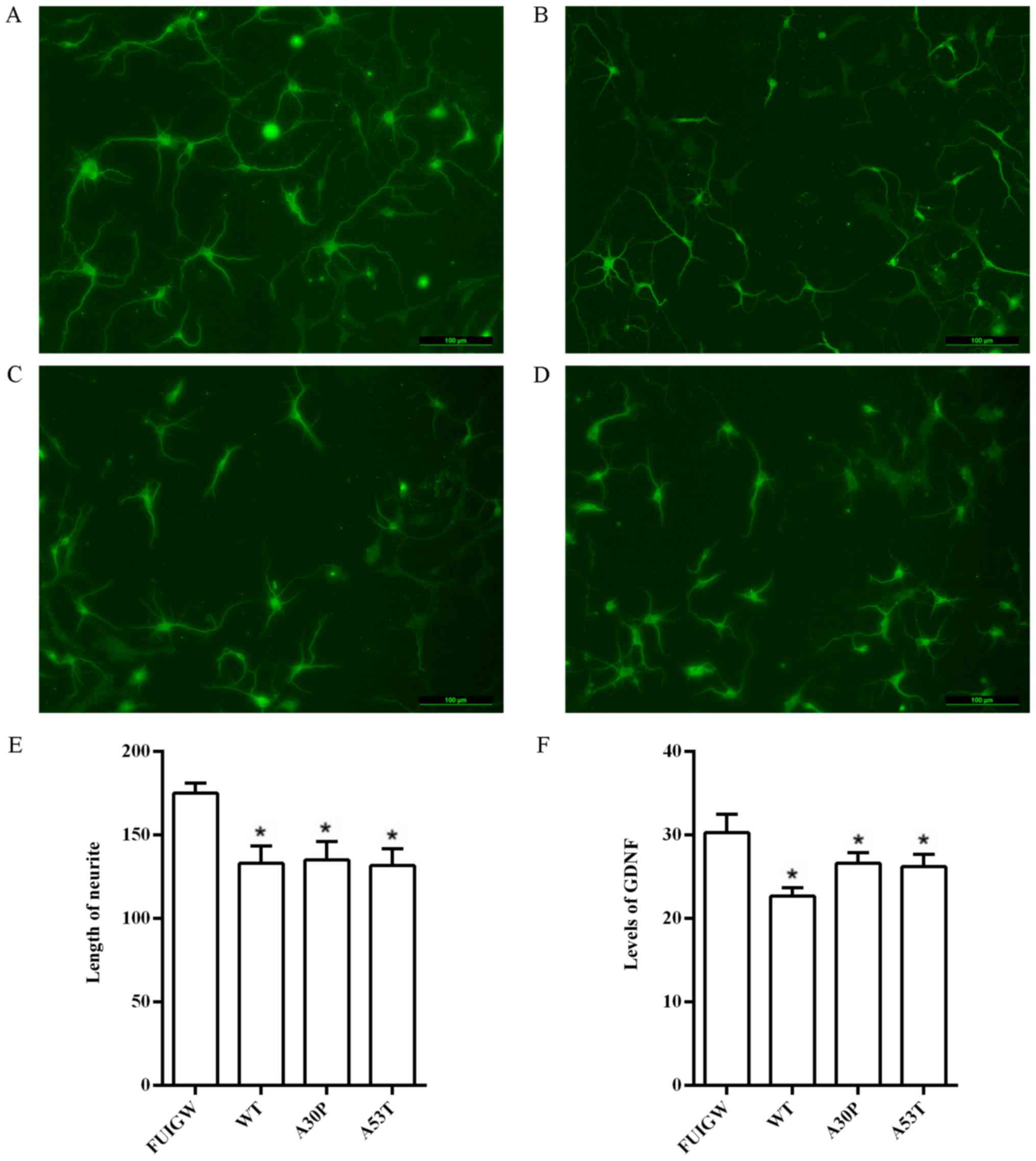|
1
|
Greenamyre JT: Glutamate-dopamine
interactions in the basal ganglia: Relationship to Parkinson's
disease. J Neural Transm Gen Sect. 91:255–269. 1993. View Article : Google Scholar : PubMed/NCBI
|
|
2
|
Kruger R, Kuhn W, Müller T, Woitalla D,
Graeber M, Kösel S, Przuntek H, Epplen JT, Schöls L and Riess O:
Ala30Pro mutation in the gene encoding alpha-synuclein in
Parkinson's disease. Nat Genet. 18:106–108. 1998. View Article : Google Scholar : PubMed/NCBI
|
|
3
|
Appel-Cresswell S, Vilarino-Guell C,
Encarnacion M, Sherman H, Yu I, Shah B, Weir D, Thompson C, Szu-Tu
C, Trinh J, et al: Alpha-synuclein p.H50Q, a novel pathogenic
mutation for Parkinson's disease. Mov Disord. 28:811–813. 2013.
View Article : Google Scholar : PubMed/NCBI
|
|
4
|
Lesage S, Anheim M, Letournel F, Bousset
L, Honoré A, Rozas N, Pieri L, Madiona K, Dürr A, Melki R, et al:
G51D α-synuclein mutation causes a novel parkinsonian-pyramidal
syndrome. Ann Neurol. 73:459–471. 2013. View Article : Google Scholar : PubMed/NCBI
|
|
5
|
Polymeropoulos MH, Lavedan C, Leroy E, Ide
SE, Dehejia A, Dutra A, Pike B, Root H, Rubenstein J, Boyer R, et
al: Mutation in the alpha-gene identified in families with
Parkinson's disease. Science. 276:2045–2047. 1997. View Article : Google Scholar : PubMed/NCBI
|
|
6
|
Zarranz JJ, Alegre J, Gómez-Esteban JC,
Lezcano E, Ros R, Ampuero I, Vidal L, Hoenicka J, Rodriguez O,
Atarés B, et al: The new mutation, E46K, of alpha-synuclein causes
Parkinson and Lewy body dementia. Ann Neurol. 55:164–473. 2004.
View Article : Google Scholar : PubMed/NCBI
|
|
7
|
Pasanen P, Myllykangas L, Siitonen M,
Raunio A, Kaakkola S, Lyytinen J, Tienari PJ, Pöyhönen M and Paetau
A: Novel α-synuclein mutation A53E associated with atypical
multiple system atrophy and Parkinson's disease-type pathology.
Neurobiol Aging. 35(2180): e1–5. 2014.PubMed/NCBI
|
|
8
|
Deng H and Yuan L: Genetic variants and
animal models in SNCA and Parkinson disease. Ageing Res Rev.
15:161–76. 2014. View Article : Google Scholar : PubMed/NCBI
|
|
9
|
Martin LJ, Pan Y, Price AC, Sterling W,
Copeland NG, Jenkins NA, Price DL and Lee MK: Parkinson's disease
alpha-synuclein transgenic mice develop neuronal mitochondrial
degeneration and cell death. J Neurosci. 26:41–50. 2006. View Article : Google Scholar : PubMed/NCBI
|
|
10
|
Rao RV and Bredesen DE: Misfolded
proteins, endoplasmic reticulum stress and neurodegeneration. Curr
Opin Cell Biol. 16:653–662. 2004. View Article : Google Scholar : PubMed/NCBI
|
|
11
|
Colla E, Coune P, Liu Y, Pletnikova O,
Troncoso JC, Iwatsubo T, Schneider BL and Lee MK: Endoplasmic
reticulum stress is important for the manifestations of
α-synucleinopathy in vivo. J Neurosci. 32:3306–3320. 2012.
View Article : Google Scholar : PubMed/NCBI
|
|
12
|
Ron D and Walter P: Signal integration in
the endoplasmic reticulum unfolded protein response. Nat Rev Mol
Cell Biol. 8:519–529. 2007. View
Article : Google Scholar : PubMed/NCBI
|
|
13
|
Lai E, Teodoro T and Volchuk A:
Endoplasmic reticulum stress: Signaling the unfolded protein
response. Physiology (Bethesda). 22:193–201. 2007.PubMed/NCBI
|
|
14
|
Shi Y, Vattem KM, Sood R, An J, Liang J,
Stramm L and Wek RC: Identification and characterization of
pancreatic eukaryotic initiation factor 2 alpha-subunit kinase,
PEK, involved in translational control. Mol Cell Biol.
18:7499–7509. 1998. View Article : Google Scholar : PubMed/NCBI
|
|
15
|
Harding HP, Zhang Y and Ron D: Protein
translation and folding are coupled by an
endoplasmic-reticulum-resident kinase. Nature. 397:271–274. 1999.
View Article : Google Scholar : PubMed/NCBI
|
|
16
|
Harding HP, Zhang Y, Bertolotti A, Zeng H
and Ron D: Perk is essential for translational regulation and cell
survival during the unfolded protein response. Mol Cell. 5:897–904.
2000. View Article : Google Scholar : PubMed/NCBI
|
|
17
|
Oyadomari S and Mori M: Roles of
CHOP/GADD153 in endoplasmic reticulum stress. Cell Death Differ.
11:381–389. 2004. View Article : Google Scholar : PubMed/NCBI
|
|
18
|
Kalia LV, Kalia SK, McLean PJ, Lozano AM
and Lang AE: α-Synuclein oligomers and clinical implications for
Parkinson disease. Ann Neurol. 73:155–169. 2013. View Article : Google Scholar : PubMed/NCBI
|
|
19
|
Gonatas NK, Stieber A and Gonatas JO:
Fragmentation of the Golgi apparatus in neurodegenerative diseases
and cell death. J Neurol Sci. 246:21–30. 2006. View Article : Google Scholar : PubMed/NCBI
|
|
20
|
Cooper AA, Gitler AD, Cashikar A, Haynes
CM, Hill KJ, Bhullar B, Liu K, Xu K, Strathearn KE, Liu F, et al:
Alpha-synuclein blocks ER-Golgi traffic and Rab1 rescues neuron
loss in Parkinson's models. Science. 313:324–328. 2006. View Article : Google Scholar : PubMed/NCBI
|
|
21
|
Lim SY, Fox SH and Lang AE: Overview of
the extranigral aspects of Parkinson disease. Arch Neurol.
66:167–172. 2009. View Article : Google Scholar : PubMed/NCBI
|
|
22
|
Karpinar DP, Balija MB, Kügler S, Opazo F,
Rezaei-Ghaleh N, Wender N, Kim HY, Taschenberger G, Falkenburger
BH, Heise H, et al: Pre-fibrillar alpha-synuclein variants with
impaired beta-structure increase neurotoxicity in Parkinson's
disease models. EMBO J. 28:3256–3268. 2009. View Article : Google Scholar : PubMed/NCBI
|
|
23
|
Halliday GM and Stevens CH: Glia:
Initiators and progressors of pathology in Parkinson's disease. Mov
Disord. 26:6–17. 2011. View Article : Google Scholar : PubMed/NCBI
|
|
24
|
Barres BA: The mystery and magic of glia:
A perspective on their roles in health and disease. Neuron.
60:430–440. 2008. View Article : Google Scholar : PubMed/NCBI
|
|
25
|
Faissner A, Pyka M, Geissler M, Sobik T,
Frischknecht R, Gundelfinger ED and Seidenbecher C: Contributions
of astrocytes to synapse formation and maturation-Potential
functions of the perisynaptic extracellular matrix. Brain Res Rev.
63:26–38. 2010. View Article : Google Scholar : PubMed/NCBI
|
|
26
|
Haydon PG and Nedergaard M: How do
astrocytes participate in neural plasticity? Cold Spring Harb
Perspect Biol. 7:a0204382014. View Article : Google Scholar : PubMed/NCBI
|
|
27
|
Koehler RC, Roman RJ and Harder DR:
Astrocytes and the regulation of cerebral blood flow. Trends
Neurosci. 32:160–169. 2009. View Article : Google Scholar : PubMed/NCBI
|
|
28
|
Silver J, Schwab ME and Popovich PG:
Central nervous system regenerative failure: Role of
oligodendrocytes, astrocytes, and microglia. Cold Spring Harb
Perspect Biol. 7:a0206022014. View Article : Google Scholar : PubMed/NCBI
|
|
29
|
Lundgaard I, Osório MJ, Kress BT,
Sanggaard S and Nedergaard M: White matter astrocytes in health and
disease. Neuroscience. 276:161–173. 2014. View Article : Google Scholar : PubMed/NCBI
|
|
30
|
Lee HJ, Suk JE, Patrick C, Bae EJ, Cho JH,
Rho S, Hwang D, Masliah E and Lee SJ: Direct transfer of
alpha-synuclein from neuron to astroglia causes inflammatory
responses in synucleinopathies. J Biol Chem. 285:9262–9272. 2010.
View Article : Google Scholar : PubMed/NCBI
|
|
31
|
La Rocca R, Fulciniti M, Lakshmikanth T,
Mesuraca M, Ali TH, Mazzei V, Amodio N, Catalano L, Rotoli B,
Ouerfelli O, et al: Early hematopoietic zinc finger protein
prevents tumor cell recognition by natural killer cells. J Immunol.
182:4529–4537. 2009. View Article : Google Scholar : PubMed/NCBI
|
|
32
|
Huang C, Hu ZL, Wu WN, Yu DF, Xiong QJ,
Song JR, Shu Q, Fu H, Wang F and Chen JG: Existence and distinction
of acid-evoked currents in rat astrocytes. Glia. 58:1415–1424.
2010.PubMed/NCBI
|
|
33
|
Shu Q, Hu ZL, Huang C, Yu XW, Fan H, Yang
JW, Fang P, Ni L, Chen JG and Wang F: Orexin-A promotes cell
migration in cultured rat astrocytes via Ca2+-dependent PKCα and
ERK1/2 signals. PLoS One. 9:e952592014. View Article : Google Scholar : PubMed/NCBI
|
|
34
|
Kaech S and Banker G: Culturing
hippocampal neurons. Nat Protoc. 1:2406–2415. 2006. View Article : Google Scholar : PubMed/NCBI
|
|
35
|
Su YR, Wang J, Wu JJ, Chen Y and Jiang YP:
Overexpression of lentivirus-mediated glial cell line-derived
neurotrophic factor in bone marrow stromal cells and its
neuroprotection for the PC12 cells damaged by lactacystin. Neurosci
Bull. 23:67–74. 2007. View Article : Google Scholar : PubMed/NCBI
|
|
36
|
Sugeno N, Takeda A, Hasegawa T, Kobayashi
M, Kikuchi A, Mori F, Wakabayashi K and Itoyama Y: Serine 129
phosphorylation of alpha-synuclein induces unfolded protein
response-mediated cell death. J Biol Chem. 283:23179–23188. 2008.
View Article : Google Scholar : PubMed/NCBI
|
|
37
|
Ramirez IB and Lowe M: Golgins and GRASPs:
Holding the Golgi together. Semin Cell Dev Biol. 20:770–779. 2009.
View Article : Google Scholar : PubMed/NCBI
|
|
38
|
Seemann J, Pypaert M, Taguchi T, Malsam J
and Warren G: Partitioning of the matrix fraction of the Golgi
apparatus during mitosis in animal cells. Science. 295:848–851.
2002. View Article : Google Scholar : PubMed/NCBI
|
|
39
|
Fujita Y, Ohama E, Takatama M, Al-Sarraj S
and Okamoto K: Fragmentation of Golgi apparatus of nigral neurons
with alpha-synuclein-positive inclusions in patients with
Parkinson's disease. Acta Neuropathol. 112:261–265. 2006.
View Article : Google Scholar : PubMed/NCBI
|
|
40
|
Sano R and Reed JC: ER stress-induced cell
death mechanisms. Biochim Biophys Acta. 1833:3460–3470. 2013.
View Article : Google Scholar : PubMed/NCBI
|
|
41
|
Xu C, Bailly-Maitre B and Reed JC:
Endoplasmic reticulum stress: Cell life and death decisions. J Clin
Invest. 115:2656–2664. 2005. View Article : Google Scholar : PubMed/NCBI
|
|
42
|
Pérez-Alvarez A and Araque A:
Astrocyte-neuron interaction at tripartite synapses. Curr Drug
Targets. 14:1220–1224. 2013. View Article : Google Scholar : PubMed/NCBI
|
|
43
|
Oliveira SL, Pillat MM, Cheffer A, Lameu
C, Schwindt TT and Ulrich H: Functions of neurotrophins and growth
factors in neurogenesis and brain repair. Cytometry A. 83:76–89.
2013. View Article : Google Scholar : PubMed/NCBI
|
|
44
|
Lin LF, Doherty DH, Lile JD, Bektesh S and
Collins F: GDNF: A glial cell line-derived neurotrophic factor for
midbrain dopaminergic neurons. Science. 260:1130–1132. 1993.
View Article : Google Scholar : PubMed/NCBI
|
|
45
|
Simón-Sánchez J, Schulte C, Bras JM,
Sharma M, Gibbs JR, Berg D, Paisan-Ruiz C, Lichtner P, Scholz SW,
Hernandez DG, et al: Genome-wide association study reveals genetic
risk underlying Parkinson's disease. Nat Genet. 41:1308–1312. 2009.
View Article : Google Scholar : PubMed/NCBI
|
|
46
|
Wang DD and Bordey A: The astrocyte
odyssey. Prog Neurobiol. 86:342–367. 2008.PubMed/NCBI
|
|
47
|
Bélanger M and Magistretti PJ: The role of
astroglia in neuroprotection. Dialogues Clin Neurosci. 11:281–295.
2009.PubMed/NCBI
|
|
48
|
Tiffany-Castiglioni E and Qian Y: ER
chaperone-metal interactions: Links to protein folding disorders.
Neurotoxicology. 33:545–557. 2012. View Article : Google Scholar : PubMed/NCBI
|
|
49
|
Li J, Ni M, Lee B, Barron E, Hinton DR and
Lee AS: The unfolded protein response regulator GRP78/BiP is
required for endoplasmic reticulum integrity and stress-induced
autophagy in mammalian cells. Cell Death Differ. 15:1460–1471.
2008. View Article : Google Scholar : PubMed/NCBI
|
|
50
|
Mukherjee S, Chiu R, Leung SM and Shields
D: Fragmentation of the Golgi apparatus: An early apoptotic event
independent of the cytoskeleton. Traffic. 8:369–378. 2007.
View Article : Google Scholar : PubMed/NCBI
|
|
51
|
Tillement JP and Papadopoulos V:
Subcellular injuries in Alzheimer's disease. CNS Neurol Disord Drug
Targets. 13:593–605. 2014. View Article : Google Scholar : PubMed/NCBI
|
|
52
|
Sundaramoorthy V, Walker AK, Yerbury J,
Soo KY, Farg MA, Hoang V, Zeineddine R, Spencer D and Atkin JD:
Extracellular wildtype and mutant SOD1 induces ER-Golgi pathology
characteristic of amyotrophic lateral sclerosis in neuronal cells.
Cell Mol Life Sci. 70:4181–4195. 2013. View Article : Google Scholar : PubMed/NCBI
|
|
53
|
Fujita Y, Okamoto K, Sakurai A, Kusaka H,
Aizawa H, Mihara B and Gonatas NK: The Golgi apparatus is
fragmented in spinal cord motor neurons of amyotrophic lateral
sclerosis with basophilic inclusions. Acta Neuropathol.
103:243–247. 2002. View Article : Google Scholar : PubMed/NCBI
|
|
54
|
Dehmelt L and Halpain S: The MAP2/Tau
family of microtubule-associated proteins. Genome Biol. 6:2042005.
View Article : Google Scholar : PubMed/NCBI
|
|
55
|
Airavaara M, Voutilainen MH, Wang Y and
Hoffer B: Neurorestoration. Parkinsonism Relat Disord. 18 Suppl
1:S143–S146. 2012. View Article : Google Scholar : PubMed/NCBI
|
|
56
|
Jiao L, Zhang Y, Hu C, Wang YG, Huang A
and He C: Rap1GAP interacts with RET and suppresses GDNF-induced
neurite outgrowth. Cell Res. 21:327–337. 2011. View Article : Google Scholar : PubMed/NCBI
|
|
57
|
Takaku S, Yanagisawa H, Watabe K, Horie H,
Kadoya T, Sakumi K, Nakabeppu Y, Poirier F and Sango K: GDNF
promotes neurite outgrowth and upregulates galectin-1 through the
RET/PI3K signaling in cultured adult rat dorsal root ganglion
neurons. Neurochem Int. 62:330–339. 2013. View Article : Google Scholar : PubMed/NCBI
|
|
58
|
Gavazzi I, Kumar RD, McMahon SB and Cohen
J: Growth responses of different subpopulations of adult sensory
neurons to neurotrophic factors in vitro. Eur J Neurosci.
11:3405–3414. 1999. View Article : Google Scholar : PubMed/NCBI
|
|
59
|
Zurn AD, Winkel L, Menoud A, Djabali K and
Aebischer P: Combined effects of GDNF, BDNF, and CNTF on motoneuron
differentiation in vitro. J Neurosci Res. 44:133–141. 1996.
View Article : Google Scholar : PubMed/NCBI
|
|
60
|
Sampaio TB, Savall AS, Gutierrez MEZ and
Pinton S: Neurotrophic factors in Alzheimer's and Parkinson's
diseases: implications for pathogenesis and therapy. Neural Regen
Res. 12:549–557. 2017. View Article : Google Scholar : PubMed/NCBI
|















